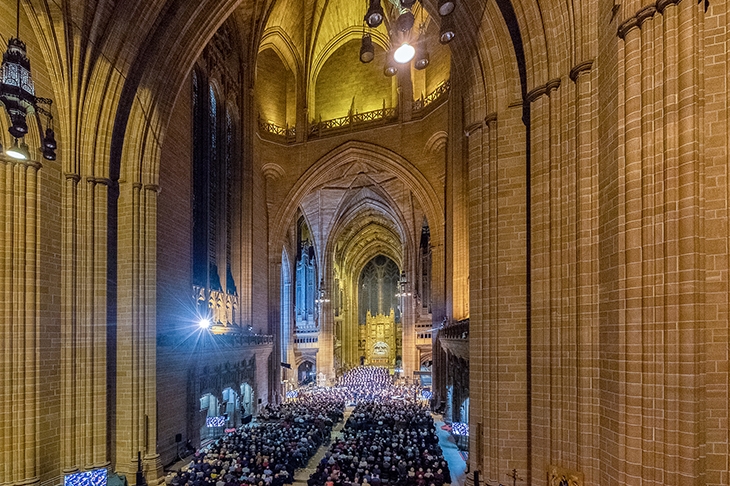‘What passing-bells for these who die as cattle?’ We’ve heard a lot, lately, of the knell that tolls through the opening bars of Benjamin Britten’s War Requiem, and at Liverpool’s Anglican cathedral it was played on actual church bells. The Royal Liverpool Philharmonic Orchestra’s percussionist Graham Johns has had a set specially cast, and as he struck them video screens relayed the moment all the way down the cathedral’s length. The orchestra was a one-off, assembled half-and-half from the RLPO and the NDR Radiophilharmonie Hannover (the conductor Andrew Manze holds positions in both cities), and this was a major civic occasion, attended by gold chains of all sizes and preceded by speeches from city worthies.
In truth, though, you could whistle ‘The Frog Chorus’ in Liverpool Cathedral and it’d still inspire awe. Giles Gilbert Scott’s immense structure doesn’t so much echo the music performed within it (though that echo is as vast as everything else) as absorb and transfigure it. Stand on the corner of Gambier Terrace and Upper Duke Street and the cathedral erupts from the sandstone gorge of St James’s Cemetery as if the rock itself is thrusting towards heaven. Construction started in 1904 when Liverpool was the second port of the Empire. By the time it was finished, the city had been reduced to the butt of glib jokes. Yet there it stands, this stupendous physical affirmation of faith and endurance: perhaps the last building in European history to be started in the full knowledge that it would take more than one lifetime to complete.
Can Britten really measure up against that sort of conviction? Manze and his combined Anglo-German forces solved the practical problems of performing in the cathedral as well as I’ve ever heard. Discreet electronic enhancement never really imposed itself between performers and audience and Manze even managed to keep the combined Hannover and Liverpool boys’ choirs together with the orchestra over a distance of what looked like about 50 metres. As for the interpretation: well, the cathedral enforces its own terms, and soloists Benjamin Appl and Ed Lyon compensated, understandably enough, with fierce over-articulation. At the moments (such as the first climax of the ‘Libera Me’) where the music seems to demand furious abandon, you felt Manze tugging back on the reins — acoustic chaos being the only alternative.
Against that was the intense concentration of the orchestral sound, the fearless, powerfully characterised solo playing of the subsidiary chamber ensemble (five Liverpudlians, seven Hanoverians) and some of the warmest, most beautifully controlled singing I’ve heard in four decades of listening to the Royal Liverpool Philharmonic chorus. Everyone present rose to the level of the occasion. The soprano soloist Susanne Bernhard sang from the pulpit, and when her voice wheeled, glowing, over the whole ensemble you could believe you were listening to a masterpiece.
You’re not, though — are you? I honestly can’t decide about the War Requiem. ‘Nothing can please many, and please long, but just representations of general nature’: sure, and people certainly respond to the piece. There must have been some 2,000 audience members on their feet at the end of this performance. But still, there’s that feeling of being lectured by a firm but faintly disapproving emotional manipulator — and that the conclusion towards which we’re corralled by all those portentous trumpets and artfully framed chunks of Wilfred Owen is as prescribed as any primary-school project. It’s become classical music’s answer to Blackadder Goes Forth, simultaneously unchallengeable and troublingly simplistic.
Other acts of musical commemoration are available, and to be fair the classical music world has made some effort to find different perspectives. The BBC Philharmonic is playing Musik für Orchester by Rudi Stephan (who died in the war), Andrew Davies has recorded Bliss’s Morning Heroes — a proto-war requiem from 1930 whose haunted search for meaning in loss feels as sincere as Britten feels contrived — and last year The Spectator’s Alexandra Coghlan surveyed recordings of Vaughan Williams’s Dona nobis pacem for Radio 3.
In Poole, where the Bournemouth Symphony Orchestra’s Ukrainian chief conductor Kirill Karabits saw his own country invaded not in 1914 but in 2014, they’ve commissioned a song cycle from Mark-Anthony Turnage. Testament sets Ukrainian poets to music of such transparent diatonic clarity that you might not at first realise that it was by Turnage. He’s woven Ukrainian folk songs into the score: pairs of woodwinds lament in close harmony and a solo flute trails birdsong across the eloquent vocal lines, sung with understated expression and wine-dark tone by Natalya Romaniw.
The final song deals harrowingly with recent events, and tastes all the more bitter for being so lucid, and so obviously without any musical agenda other than compassion. The BSO, whose strings were sombre, sinewy and utterly Slavic, played Testament as if it were as much of a classic as the Britten. Give it time.






Comments